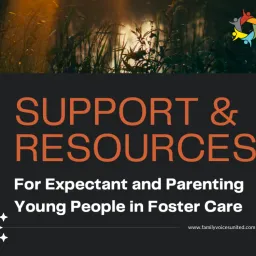Great question. Family Voices United, a collaborative project with the Children’s Trust Fund Alliance, Generations United, FosterClub and Casey Family Programs presented this question to young people, birth parents and kinship/relative caregivers. The goal was to communicate their responses -- the responses of those who have lived through or are living through the child welfare system – to organizations and policymakers so they can make informed decisions that affect the people they serve. Those with lived experience have unique perspectives and expertise that must be not only heard but be centered in the decisions that most affect them.
Listening to Constituent Voices
When asking constituents about the kinds of support services that would help them during or post pregnancy, some common themes emerged. Themes help us focus on the areas in which services are currently lacking or where we can make improvements. One theme that emerged was the need to facilitate networks of support for young people. Being in the system can feel like a solitary experience; young people can feel isolated and on their own. As a constituent from Virginia stated, "There needs to be more emphasis on ensuring that these individuals feel cared about and seen. Check-ins are needed as well as just a listening ear. Many youths face hard times and just want someone who will listen and simply be there for them."
Suggestions to improve networks of support include committing to transparent communication for all people involved, nurturing relationships and visits among the birth family, foster family, the young person and their child, and finding opportunities to collaborate with families and organizations (FAFSA, scholarships) for the best interest of the young person and child.
Honoring mental health was another key theme to emerge. A constituent from Maine noted that "Expectant and parenting youth in foster care need someone to encourage them and believe in them when things aren't easy. And the truth is we all need that in life."
There are many wayss to honor the mental health of expectant and/or parenting foster youth in care. Suggestions from constituents included exploring respite services and care, providing childcare support, securing state and governmental-level support assurances, and connecting them to pregnancy and parenting education, especially for neurodivergent children and older children.
While some states and tribes do provide these kinds of services, some may not. Offering tailored counseling for all people involved in the child's life could lift some of the challenges young people may be experiencing. Teaching healthy coping strategies is another suggestion. As a constituent from Oregon noted, expectant and parenting young people “should receive priority enrollment for any local/state child care and early learning programs that allow for care during school, work, ILP services, and extracurricular activities. This allows them to have support as a parent to continue to work on their own educational and professional goals."
Share with your Networks
Family Voices United created a downloadable report containing the complete compilation of constituent responses. The themes and priorities from this report can help others gain valuable insight into the child welfare system from the perspective of those who have lived it. We encourage you to share this information with your local policymakers and those working within the system. The people making laws and decisions about the future of child welfare must hear from those who have experience with the systems that their actions impact.. We believe that creating community among those with lived experience starts by sharing their stories and identifying common experiences.
To read and download the full report, visit this link.

